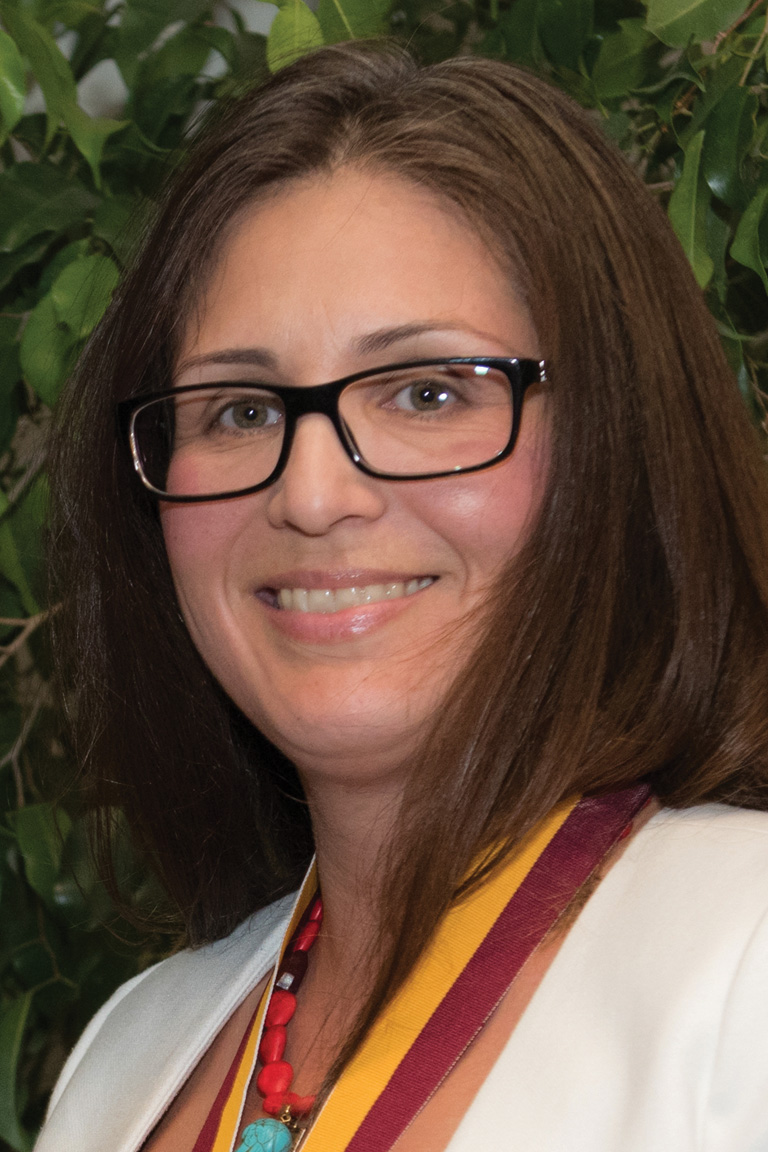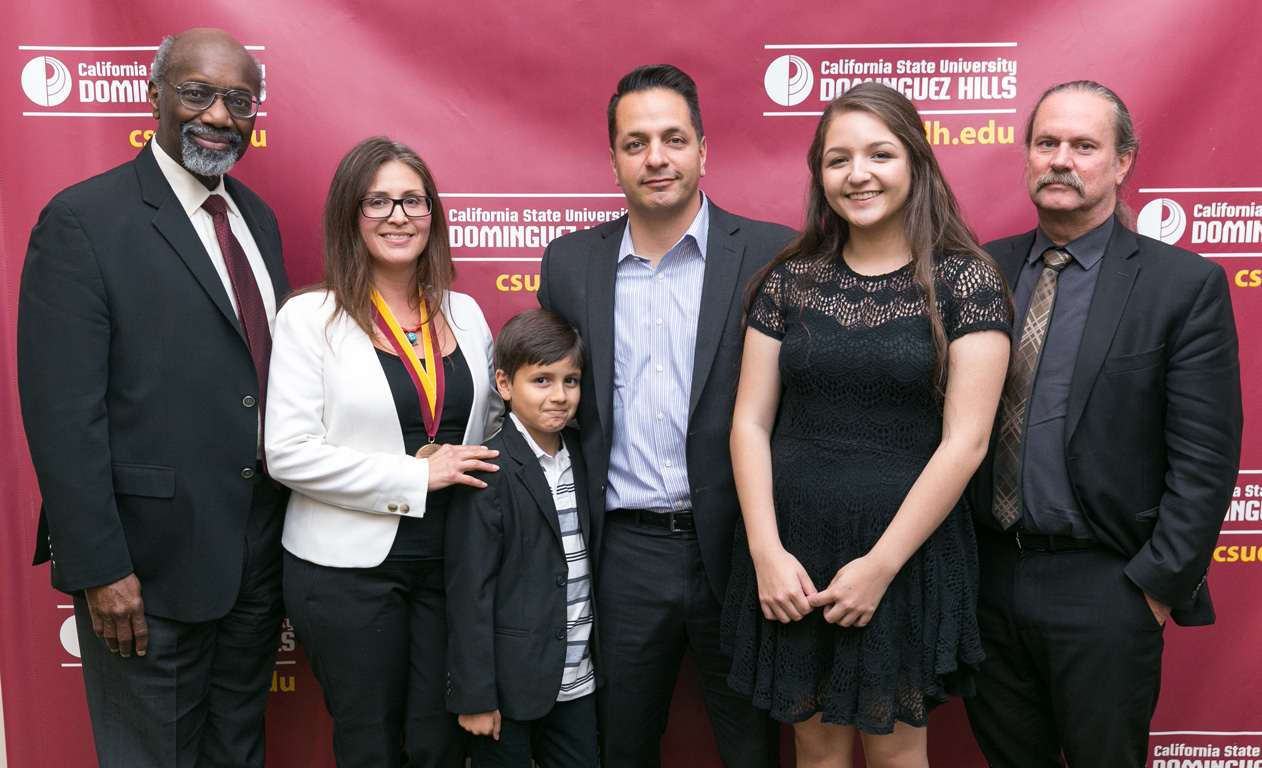 For her reputation as an engaging and inspirational educator, and as a champion for high-impact practices (HIPs) at California State University, Dominguez Hills (CSUDH), Marisela Chávez, associate professor and chair of Chicana and Chicano Studies, was honored with the 2016 Lyle E. Gibson Dominguez Hills Distinguished Teaching Award.
For her reputation as an engaging and inspirational educator, and as a champion for high-impact practices (HIPs) at California State University, Dominguez Hills (CSUDH), Marisela Chávez, associate professor and chair of Chicana and Chicano Studies, was honored with the 2016 Lyle E. Gibson Dominguez Hills Distinguished Teaching Award.
Chavez will carry the University Mace, an honor reserved for highly distinguished faculty members, along with fellow honoree associate professor and chair of the Department of Modern Languages Ivonne Heinz Balcazar, at the College of Arts and Humanities Commencement Ceremony at 9 a.m. on Saturday, May 21.
Named for CSUDH’s founding university vice president of academic affairs, the award recognizes individuals whose teaching is not only exemplary, but also demonstrates an active interest in the progress of students, and seeks new and creative ways to engage them.
“Receiving this award has given me the opportunity to think about my teaching in more profound ways, and reflect upon the teachers I have had in my own life and what I learned from them,” said Chávez. “I thought, ‘What made them great teachers? How did I craft my own teaching strategies, my own pedagogy?’ And I came to realize that the models of great teaching for me were based on three things: love, hope, and social justice.
“Love shapes my endeavor to provide a space where students are honored and challenged to make their own futures,” Chávez added. “Hope fuels my attempts to ensure that all students who come to my classes find the knowledge and skills that change the way they had previously viewed history and their own lives. …And the desire for social justice frames my ideal that students use these experiences to imagine and achieve a purposeful future for themselves and their communities.”
Chávez, who has been a faculty member at CSUDH since 2005, teaches and researches a wide range cultural and gender related topics, including Chicana/o history, and identity; women of color feminisms; U.S. social movements; oral history; and Latino/a immigration, as well as politics.
In the classroom, she engages in issues of diversity and global learning, co-curricular activities, undergraduate research, and collaborative learning/writing with her students. She creates a “rich classroom environment based on a foundation and sense of community, shared purpose, responsibility, and student agency.”
Chávez students are predominantly first-generation Latino/a college students, and more often than not, the first generation born in the United States.
“Cal State Dominguez Hills students are hungry for knowledge of their own history and rich in grit,” according to Chávez. “This dynamic has shaped my teaching to focus on the intersections of how students learn and engage, as well as what they are learning. For all of my courses, I have connected assignments to events beyond the walls of the classroom and brought in guest speakers to provide students with alternative perspectives.”
Extremely active on and off campus, Chávez serves on CSUDH’s General Education Committee, the University Writing Committee, and the faculty advisory board for the Women’s Studies Program. She is a national advisory board member for Chicana Por Mi Raza: Uncovering the Hidden History of Chicana Feminism, and serves on the preliminary selection committee for the Woodrow Wilson Dissertation Fellowship in Women’s Studies.
 Chávez also collaborated with colleagues to develop the First-Year Seminar Program, which allows faculty to propose and teach a course in their area of expertise using the existing UNV 101 structure.
Chávez also collaborated with colleagues to develop the First-Year Seminar Program, which allows faculty to propose and teach a course in their area of expertise using the existing UNV 101 structure.
As a result of her interest and research on the influence HIPs can have on underrepresented students, Chávez was appointed as the first Academic Affairs Administrative Fellow at CSUDH. In that role, she was tasked with collaborating and coordination with several units on campus to institutionalize HIPs on campus, which is now integrated into the University Strategic Plan.
In 2014, Chávez organized with colleagues the “Get HIP with Teaching!: High-Impact Practices in the Classroom and Beyond” symposium.
“She scoured campus faculty to identify those who had been using specific high-impact practices and asked them to develop presentations regarding their use of such practices as collaborative projects, diversity/global learning, and service learning, to name a few,” wrote Keisha C. Paxton, professor of psychology, in a nomination letter for Chávez’s faculty award. “This conference was so successful; it was the impetus for an annual teaching conference highlighting high-impact practices and other campus initiatives to support effective teaching and student engagement.”
Chávez’s nomination file actually included multiple letters of support from faculty colleagues, as well as current and former students and alumni, all of whom described her as an extraordinary educator and mentor who “challenges students to think critically, and encourages and inspires them to pursue graduate degrees.”
“I’ve had the pleasure of seeing how her teaching inspires her students to do amazing projects,” wrote Vivian Price, associate professor interdisciplinary students at CSUDH. “For several semesters she has engaged students in doing research that culminated not only in a written paper, but also found expression in public manifestos, using signs, posters, art and cultural work to convey ideas to the campus community.”
For Chávez, learning is a two-way street, and she plans to continue connecting new intersections and mapping creative paths to success at CSUDH.
“How I teach is continually influenced by my students and my colleagues, and I learn from my students as much as I hope they learn from me,” said Chávez. “The CSUDH community has inspired me to continue to strive for new and meaningful ways of engaging students.”